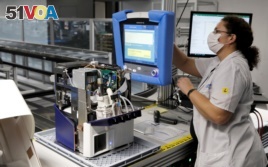13 April 2020
Health officials around the world are asking for more ventilators to treat coronavirus patients. There are a few doctors, however, who are moving away from using the machines.
The reason: Some hospitals have reported unusually high death rates for coronavirus patients on ventilators. Some doctors worry that the machines could be harming patients with some conditions.
Doctors are still learning the best way to control the virus, which appeared only a few months ago. Some doctors are making decisions quickly as they face a large number of patients and too few medical supplies.
Mechanical ventilators push oxygen into the lungs of sick patients. Using the machines means putting the patient to sleep and pushing a tube into their throat. Deaths in patients who need ventilators are common.

An employee of Hamilton Medical AG tests a ventilator at a plant in Domat/Ems, Switzerland March 18, 2020. REUTERS/Arnd Wiegmann
About 40 percent to 50 percent of patients with severe breathing problems die while on ventilators, experts say. But 80 percent or more of coronavirus patients placed on the machines in New York City have died, state and city officials say.
Higher-than-normal death rates also have been reported in other places in the U.S., said Dr. Albert Rizzo. He is the American Lung Association's chief medical officer.
Similar reports have come from China and Britain. One British report said that 66 percent of those put on ventilators died.
The reason is not clear. Some experts said it might have to do with the health of the patients before they were infected. Or, it could be related to how sick the patients had become by the time they were put on the machines.
But health officials have wondered whether ventilators might be making the situation worse in some patients.
Experts say ventilators can be damaging to a patient because of the pressure on the lungs as the oxygen is forced in over time.
"We know that mechanical ventilation is not benign,"said Dr. Eddy Fan. He is with Toronto General Hospital. "We have to be careful how we use it," he added.
But some doctors say they are trying to keep patients off ventilators as long as possible. They are using other medical technology instead.
Only a few weeks ago in New York City, very sick coronavirus patients were put on ventilators to keep them breathing, said Dr. Joseph Habboushe. He is an emergency room doctor who works in Manhattan hospitals.
But physicians are trying other treatments first. One includes giving patients oxygen through tubes in the nose; another is having patients lie in different positions to let air into the lungs.
He said those decisions are separate from worries that there are not enough ventilators in the United States. That is also a worry, Habboushe added.
There are reports that coronavirus patients are usually on ventilators much longer than other patients, said Dr. William Schaffner. He is an infectious diseases expert at Vanderbilt University.
Experts say before coronavirus, a patient was on a ventilator for only one or two days. Coronavirus patients use ventilators for up to 15 days, and they are dying. The long 15-day period is the reason doctors are worried about a shortage of ventilators. As cases increase, doctors may be forced to decide who gets one and who does not.
I'm Bryan Lynn.
The Associated Press reported this story. Susan Shand adapted it for Learning English. Mario Ritter, Jr.was the editor.
________________________________________________________________
Words in This Story
ventilator– n. a machine that mechanically forces air into the lungs of a sick patient to keep them breathing
mechanical– adj. related to the work or operation of a machine
benign– adj. not causing harm